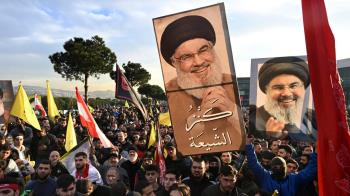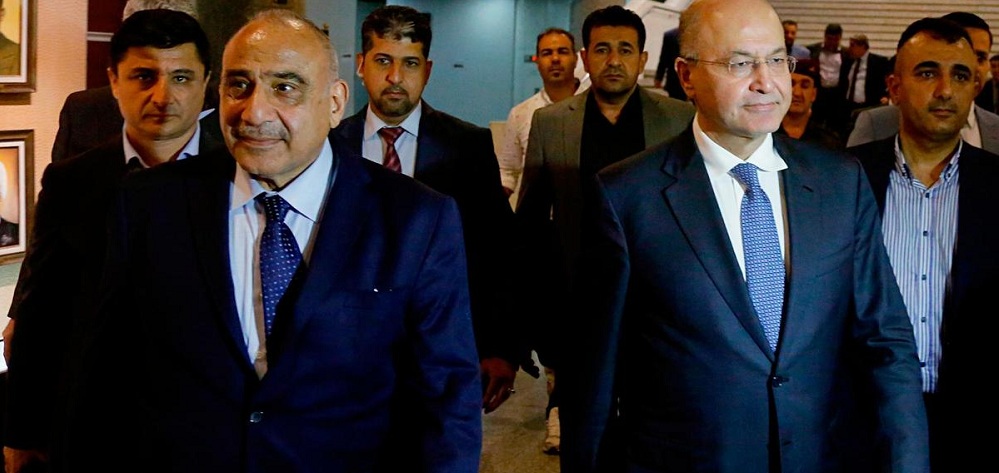Alwaght- After the political marathon in Iraq to pick a new president and a prime minister, the country’s politics now witnesses a debate of how the experienced, technocratic Prime Minister-designate Adel Abdul Mahdi will form his cabinet. When Abdul Mahdi was named for the post, he vowed to put meritocracy first in choosing his ministers, adding that his government will be strong and cross-party including figures from all Iraqi political factions regardless of their ethnicity or religion.
Alwaght has talked to Sayed Mahdi Afqahi, an Iranian West Asia affairs expert, asking him for comments on the new government’s plans, as well as the challenges and obstacles ahead.
When asked about how the new cabinet will look like, Mr Afqahi told the parties in this year’s election talked against sectarian quota system in hope of attracting the maximum votes. This view was held by the Shiite alliances such as Saeroon and Fatah, as well as other blocs.
“With the parties’ shift of vision and expanding their horizons, I believe that Iraq will move, with a gentle slope, from the sectarian approach to a patriotic one to form a national unity government. In fact, the participant parties insisted on driving out the sectarian quota system and highlighted the need for Iraqis unity to beat the problems.”
Mr Afqahi continued that President Barham Salih, Speaker Mohamed al-Halbusi, and PM-designate Adel Abdul Mahdi all strongly believe in this political path and have recently raised the slogans anew. Abdul Mahdi, for example, vowed to form a government where no political party feels marginalized. He, thus, told the Shiite, Sunni, and Kurdish factions to each name four ministers for each post. This will pave the way for a national unity government, according to him.
“With regard to the pro-inclusion, cross-sectarian rhetoric of the Iraqi politicians, Abdul Mahdi works towards the realization of this aim.”
But Mr Afqahi pointed to the fact that uniting all Iraqis around this anti-sectarianism ideal is a difficult job, adding that to date none of the PMs managed to materialize this ideal. He, however, maintained that Abdul Mahdi enjoys wide-ranging acceptance and support by both the politicians and the clergy. So, he can learn from the previous governments' mistakes and form a technocratic government.
Alwaght also asked the expert about the key challenges the new government will face. He replied that the challenges are both at home and abroad. Domestically, according to him, Abdul Mahdi will face financial and administrative corruption, which is a hugely heavy case.
“If he forms the best cabinet but declines to seriously fight bribery and the labyrinthine network of banking and financial mafia– the heavy cases which remained unsolved by the previous PM Haider al-Abadi–, he will certainly fail to proceed with his programs.”
Essentially, the parties strongly insisted that corruption needs to be uprooted. Sayyed Muqtada al-Sadr, Saeroon's leader, has set an ultimatum for the new government to effectively fight corruption, warning that if it fails to meet the demand, he will sink the government. Fatah bloc, led by Hadi al-Amiri, also placed its main emphasis on the anti-corruption fight which has so far marred many development programs.
“Another internal issue,” Mr Afqahi told Alwaght, “is the reconstruction of Iraq. We can now say that Iraq is a ruined country. Three largest and most strategic provinces of Iraq have been destroyed by ISIS. Beside ISIS destruction, the Americans under the excuse of fighting ISIS reduced to rubble many areas in Nineveh, Salahaddin, and Anbar provinces, making them uninhabitable for years. I visited them in person.”
Another big issue at home is the unemployment, according to the Iranian expert. The oil sales income is only enough to pay the salaries of the state workers and armed forces personnel. So, the government’s hands to create jobs along with the pursuing rebuilding projects will be tied. If it seeks to borrow money from the World Bank or the International Monetary Fund, then it should meet the tough demands of the creditors. This, in turn, will lead to further reliance on abroad.
“So the government has to rely on home achievements of the fight against corruption and also expand cooperation with its strategic neighbor, Iran. Partnership with Tehran in areas like oil, gas, and electricity production, and technology transfer will be useful to Iraq. Baghdad apparently saw the fruits of anti-terror cooperation with Iran. But Saudi Arabia is an origin of terrorism. Turkey still occupies parts of Iraqi territories. Syria is itself in need of help amid the devastating war against terrorism. And the US, as another partnership choice, seeks to dominate Iraq and loot its oil.”
Yet another challenge the new government is facing is the American military presence. Now some 7,000 American troops are present in Iraq, which is contrary to the security pact between the two countries, signed in 2008 that was aimed at training the Iraqi army and helping it reorganize.
“The question for the Iraqis is that what these 7,000 troops under the guise of military advisors are doing in Iraq. Was this approved by the parliament, or is it a secret agreement between al-Abadi (former premier) and Washington? The US has under construction its biggest consulate in the world in Erbil, with a size of 24 hectares.”
Mr Afqahi also commented on the future of relations between Baghdad and the Kurds under Abdul Mahdi. He noted that this issue is related to the autonomous region’s demands from the central government. Masoud Barzani, the former president of the Kurdistan Regional Government, has recently called on Baghdad to hand back Kirkuk to the Kurds. “Certainly, neither the parliament nor the al-Hashd Al-Sha'abi [Arabic name for Popular Mobilization Forces] will allow Abdul Mahdi to return the oil-rich Kirkuk to Barzani to sell its oil to Israel and Turkey.”
Mr Afqahi also pointed to the foreign challenges of the new government. The first challenge, he said, is the American influence in Iraq's political, military, cultural, and financial areas, despite the fact that this year’s election indicated a sharp decline in the US sway in Iraq, which can be labeled a decline from strategic to tactical level. Abdul Mahdi and Salih's relationship with Washington will never be submissive as was that of Barzani and Osama al-Nujaifi, former parliament speaker. “Another foreign challenge is the Turkish military presence in Bashiqa region in northern Iraq,” he continued.
Afqahi also addressed the chances of victory over the challenges ahead, saying it depends on the makeup of the cabinet, genuine anti-corruption fight, and the popular and clergy help. He said the new PM should make priorities. First, he should solve the main problems like unemployment and meet the people’s basic needs. This will win him people’s support which is necessary for dealing with heavier problems. “Empty slogans only dangerously infuriate people,” the pundit concluded.



























